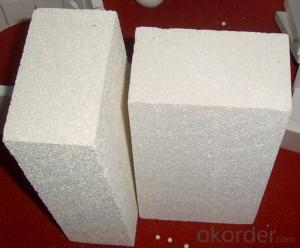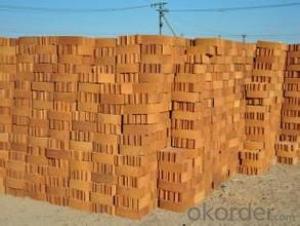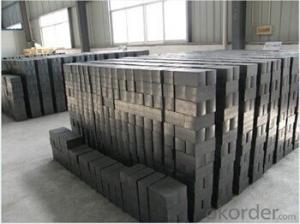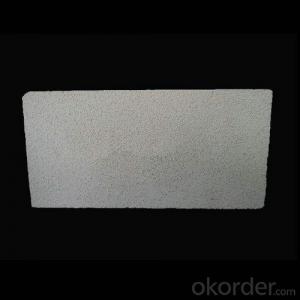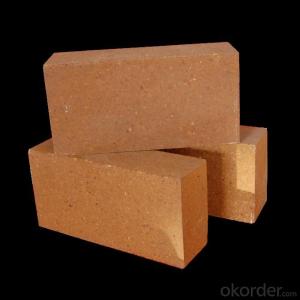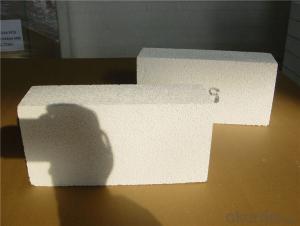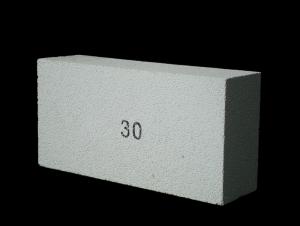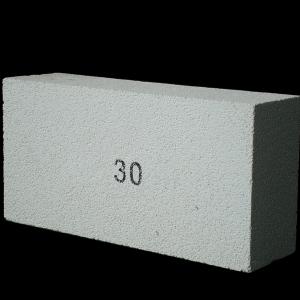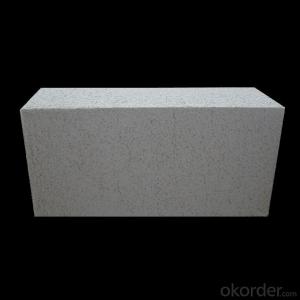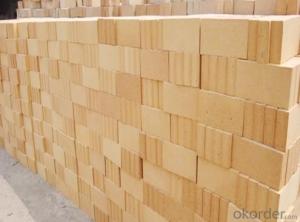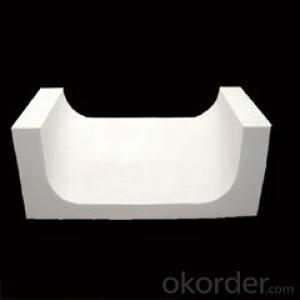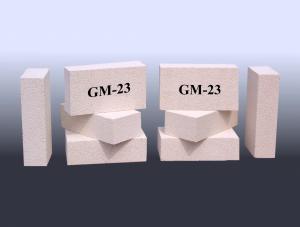Refractory GJM Mullite Insulation Brick GJM-30
- Loading Port:
- Shanghai
- Payment Terms:
- TT OR LC
- Min Order Qty:
- 10 m.t.
- Supply Capability:
- 1000 m.t./month
OKorder Service Pledge
OKorder Financial Service
You Might Also Like
Refractory GJM Mullite Insulation Brick GJM-30Specifications
mullite insulation brick
1. Low thermal conductivity
2.High hot compressive strength
3.Perfect Energy saving
Refractory GJM Mullite Insulation Brick GJM-30Light weight mullite insulation furnace bricks refractory for sale
Advantage
1. Low thermal conductivity
2.High hot compressive strength
3.Perfect Energy saving
Refractory GJM Mullite Insulation Brick GJM-30
Description:
Lightweight mullite kiln bricks refractory for sale are made from good quality and superpure raw materials, with strictly classified fillings according to their grades. These fillings can form a uniform pore structure after burnt during the process of manufacture. Each grade of products has unique design to meet different thermal, physical and chomical demands.
Application:Refractory GJM Mullite Insulation Brick GJM-30
Mullite insulation furnace bricks refractory material can be used in linings or heat-insulating materials of the industries, such as, ethylene pyrolysis furnaces, tubular furnaces, reforming furnaces of synthetic ammonia, gas generators and high-temperature shullte kilns, etcRefractory GJM Mullite Insulation Brick GJM-30
Mullite Insulation furnace refractory material can be used as working lining, where contact with flames directly. This kind of brick can save the kiln energy very muchRefractory GJM Mullite Insulation Brick GJM-30
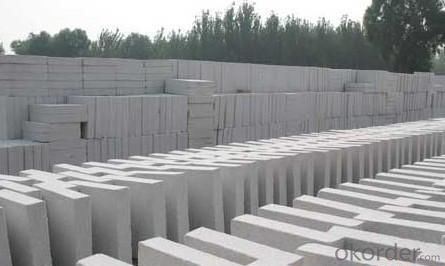
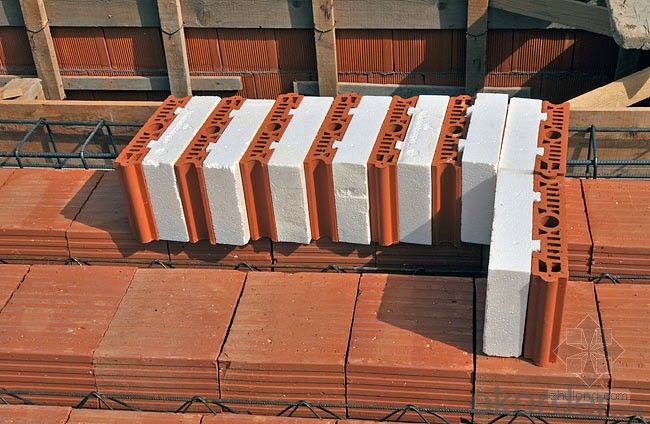
- Q:Are insulating fire bricks resistant to fluorine gas?
- Yes, insulating fire bricks are generally resistant to fluorine gas due to their refractory properties and ability to withstand high temperatures and chemical corrosion.
- Q:Are insulating fire bricks resistant to moisture absorption?
- Yes, insulating fire bricks are highly resistant to moisture absorption. They are designed to have low porosity and are made from materials that do not readily absorb water. This makes them ideal for applications where moisture resistance is crucial, such as in kilns, furnaces, and other high-temperature environments.
- Q:What is the thermal insulation performance of aerated bricks?
- Aerated brick light weight, heat preservation, heat insulation, sound insulation, easy processing, using a variety of hybrid material production, rich production of raw materials, especially the use of fly ash, and comprehensive utilization of industrial waste, environmental pollution, saving farmland, have a good social and economic benefits, is an alternative to the traditional solid clay brick ideal wall materials. Gongyi Machinery Factory is specialized in producing aerated brick equipment manufacturers.
- Q:Can insulating fire bricks be used in the construction of combustion flues?
- Insulating fire bricks are indeed suitable for the construction of combustion flues. Their high temperature resistance makes them perfect for environments that require heat resistance. Combustion flues face extreme heat and gases produced during combustion, but insulating fire bricks can safeguard the flue structure from intense heat and prevent heat loss. Furthermore, these bricks have low thermal conductivity, which effectively insulates and retains heat within the flue. As a result, the combustion process becomes more efficient, reducing energy waste. Ultimately, incorporating insulating fire bricks into the construction of combustion flues can enhance the safety, efficiency, and durability of the flue system.
- Q:Can insulating fire bricks be used in refractory fibers?
- No, insulating fire bricks cannot be used in refractory fibers. Insulating fire bricks are solid bricks made from refractory materials and are used for insulating and retaining heat in high-temperature applications. On the other hand, refractory fibers are lightweight and flexible materials made from ceramic or mineral fibers. They are used for insulation and lining in various industrial applications, including furnaces, kilns, and boilers. The two materials have different properties and structures, and are not compatible with each other. Therefore, it is not recommended to use insulating fire bricks in refractory fibers.
- Q:Are insulating fire bricks resistant to thermal bridging?
- Yes, insulating fire bricks are resistant to thermal bridging. These bricks are designed to minimize heat transfer by reducing thermal conductivity, making them an effective solution for preventing thermal bridging in various applications.
- Q:Are insulating fire bricks easy to handle and install?
- Yes, insulating fire bricks are generally easy to handle and install. They are lightweight and can be easily transported and positioned in place. Additionally, they are designed with interlocking shapes or grooves that make it convenient to stack and secure them together during installation. Overall, insulating fire bricks are user-friendly and straightforward to work with.
- Q:Can insulating fire bricks be used in the construction of boilers?
- Yes, insulating fire bricks can be used in the construction of boilers. These bricks have excellent thermal insulation properties, making them suitable for use in high-temperature applications such as boiler construction. They help to reduce heat loss, improve energy efficiency, and enhance the overall performance of the boiler system.
- Q:Can insulating fire bricks be used in the construction of cremation chambers?
- Yes, insulating fire bricks can be used in the construction of cremation chambers. These bricks are designed to withstand high temperatures and provide excellent insulation, which is crucial in maintaining the desired temperature and preventing heat loss during the cremation process.
- Q:How do insulating fire bricks compare to other insulation materials like ceramic fiber?
- Insulating fire bricks are generally denser and more durable compared to ceramic fiber insulation materials. While ceramic fiber offers excellent thermal insulation and is lightweight, insulating fire bricks provide better resistance to high temperatures and mechanical stress. Additionally, insulating fire bricks have lower thermal conductivity and higher compressive strength, making them suitable for applications that require long-term thermal insulation and structural support.
1. Manufacturer Overview |
|
|---|---|
| Location | |
| Year Established | |
| Annual Output Value | |
| Main Markets | |
| Company Certifications | |
2. Manufacturer Certificates |
|
|---|---|
| a) Certification Name | |
| Range | |
| Reference | |
| Validity Period | |
3. Manufacturer Capability |
|
|---|---|
| a)Trade Capacity | |
| Nearest Port | |
| Export Percentage | |
| No.of Employees in Trade Department | |
| Language Spoken: | |
| b)Factory Information | |
| Factory Size: | |
| No. of Production Lines | |
| Contract Manufacturing | |
| Product Price Range | |
Send your message to us
Refractory GJM Mullite Insulation Brick GJM-30
- Loading Port:
- Shanghai
- Payment Terms:
- TT OR LC
- Min Order Qty:
- 10 m.t.
- Supply Capability:
- 1000 m.t./month
OKorder Service Pledge
OKorder Financial Service
Similar products
New products
Hot products
Related keywords
